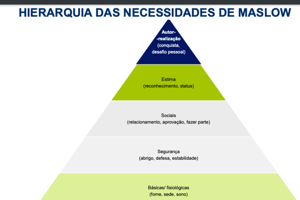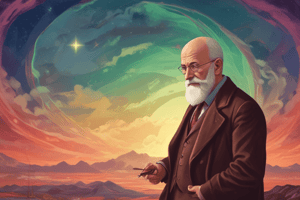Podcast
Questions and Answers
According to Sigmund Freud, which aspect of the mind governs behavior?
According to Sigmund Freud, which aspect of the mind governs behavior?
- Conscious mind
- Unconscious mind (correct)
- Social mind
- Rational mind
Immanuel Kant believed that knowledge is independent of sensory experience.
Immanuel Kant believed that knowledge is independent of sensory experience.
False (B)
What does Patricia Churchland argue is necessary to understand the mind?
What does Patricia Churchland argue is necessary to understand the mind?
Understanding the brain
According to Ryle, the self (ego) is best measured by a person's __________.
According to Ryle, the self (ego) is best measured by a person's __________.
Which of the following statements aligns with Freud's perspective on the mind?
Which of the following statements aligns with Freud's perspective on the mind?
Patricia Churchland believes that the mind exists independently of the brain.
Patricia Churchland believes that the mind exists independently of the brain.
Who stated, 'You may know me but you have no idea who I am'?
Who stated, 'You may know me but you have no idea who I am'?
Match the philosopher with their view on the self or mind:
Match the philosopher with their view on the self or mind:
Which level of the mind is responsible for memories that are not currently in awareness but can be easily accessed?
Which level of the mind is responsible for memories that are not currently in awareness but can be easily accessed?
According to Freud, the unconscious mind is the only part responsible for shaping adult behavior.
According to Freud, the unconscious mind is the only part responsible for shaping adult behavior.
Name the psychologist who emphasized the body's role in understanding the self.
Name the psychologist who emphasized the body's role in understanding the self.
Freud identified specific changes in the sexual parts of the body he called __________ zones.
Freud identified specific changes in the sexual parts of the body he called __________ zones.
Match the following concepts with their descriptions:
Match the following concepts with their descriptions:
What does Freud believe must be understood to comprehend one’s present self?
What does Freud believe must be understood to comprehend one’s present self?
Merleau-Ponty claimed that truth lies solely within the individual's inner self.
Merleau-Ponty claimed that truth lies solely within the individual's inner self.
Which principle did Freud use to explain personality and mental state?
Which principle did Freud use to explain personality and mental state?
What does Descartes mean by 'Cogito ergo sum'?
What does Descartes mean by 'Cogito ergo sum'?
Locke believed that knowledge could be derived independently of sensory experiences.
Locke believed that knowledge could be derived independently of sensory experiences.
What do both Locke and Hume have in common regarding the source of knowledge?
What do both Locke and Hume have in common regarding the source of knowledge?
According to Locke, the mind is considered a ________ slate.
According to Locke, the mind is considered a ________ slate.
Match the following philosophers with their beliefs about the self:
Match the following philosophers with their beliefs about the self:
What does Hume argue regarding innate ideas?
What does Hume argue regarding innate ideas?
Descartes believed that the body and mind are linked and cannot be separated.
Descartes believed that the body and mind are linked and cannot be separated.
For Hume, knowledge occurs through ________ experiences.
For Hume, knowledge occurs through ________ experiences.
Flashcards are hidden until you start studying
Study Notes
Iceberg Principle of Personality
- Explains mental state and behavior through three levels of the mind: unconscious, preconscious, and consciousness.
- Past experiences are embedded in the unconscious, can reach preconscious, and eventually consciousness, especially triggered by similar experiences.
Merleau-Ponty's Perspective
- Emphasizes that understanding oneself requires being in the world: "Truth does not inhabit only the inner man."
- Posits that the body is the primary means of contact with the world, essential for perception and experience.
- Integrates physical body and experiences to form the self.
Freud's Psychosexual Stages of Development
- Identifies changes in sexual parts of the body known as erogenous zones: mouth, anus, phallic, and genital stages corresponding to developmental age.
- Claims untoward adult behavior reflects unsatisfied desires from earlier developmental stages.
- Suggests understanding present self requires comprehension of past experiences.
Gilbert Ryle's Concept of Self
- Defines the self (ego) based on actions: "I act therefore I am."
- Proposes that behavior is a reflection of the mind's commands, separating the mind from the physical body.
Immanuel Kant's Understanding of Knowledge
- Asserts that knowledge begins with the senses and is organized by the mind, concluding with reason.
- Describes inner and outer selves, where outer self consists of external experiences synthesized by the inner self.
Patricia Churchland's Neurophilosophy
- Advocates for understanding the mind through the brain, proposing a revision of common sense towards a biological perspective.
- Argues that the mind does not exist independently; rather, knowledge is developed through experience.
John Locke's Empirical Approach
- States, "there is nothing in the mind except what was first in the senses."
- Suggests that the self is constructed from consciousness shaped by sensory experiences.
René Descartes' Cogito Argument
- Asserts "Cogito ergo sum" or "I think therefore I am," identifying self as a thinking entity capable of doubting, affirming, and reasoning.
- Proposes Cartesian dualism: the mind (seat of consciousness) and body are separate entities.
David Hume's Views on Knowledge and Self
- Contends that all knowledge derives from human senses, where personal experiences define understanding.
- Critiques the existence of innate ideas, suggesting that knowledge emerges from experience and non-tangible concepts are mere illusions.
- Argues that the self is an illusion; no permanent, continuous self exists over time.
Studying That Suits You
Use AI to generate personalized quizzes and flashcards to suit your learning preferences.




